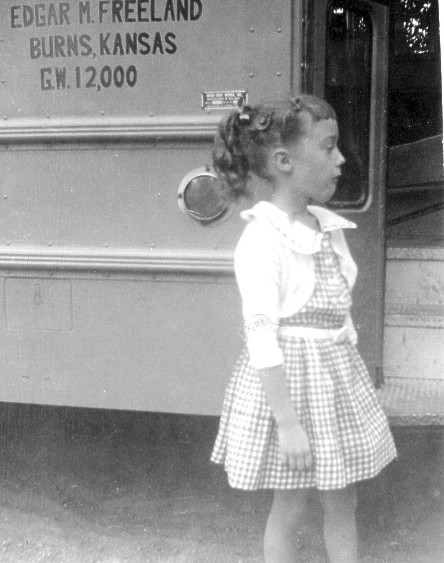Kansas Snapshots by Gloria Freeland - Nov. 1, 2013
"Misty, water-colored memories"
For people who love history as much as husband Art and I do, having a good memory is a valuable asset. But because even the
best memories can falter at times, it's good to exercise a healthy skepticism of personal recollections - even our own. We
have recently been doing some work in Clay County, Kansas, where Cathy Haney is the historical museum director. When asked a
question, she'll often finish an answer she's pulled from the top of her head with "Now that's history according to Cathy."
But some people do possess an amazingly accurate ability to recall events. Art first became curious about his family's
background when he was 13. Over two days, he sat with his mother's parents and quizzed them about when their parents came to
America, where they lived and many other things. Being interested in science, he realized everything he was being told would
have to be validated because memory wasn't something to be relied on. While it took more than 40 years to do it, he was stunned
to discover that every single detail checked out.
Whenever I quizzed my Dad and his brothers about their growing-up years during the Depression or their experiences during
World War II, I was amazed at how their answers would invariably line up - even down to the smallest details, such as the model
of tractor Grandpa was using at the time or the color of the car the family was driving.
In contrast, Art's Uncle Dahl would sometimes give a short speech to the assembled family members at Vaughan family reunions.
More often than not, there would be references to things that happened when he was young. Art noted his Dad Tom sometimes developed
a slight smile during these recollections. When pressed, Tom would share what had really happened. Art was pretty sure that
Dahl's memory was not to be relied on when he discovered Dahl, who was never one to shade the truth, had actually "misremembered"
his own middle name!
Even a perfect memory doesn't guarantee that a recollection will be accurate. My third cousin worked for the Federal Bureau
of Investigation. Dave once mentioned that he had never talked to anyone who had been held at gunpoint who didn't describe the
gun as being VERY big.
For those of us who have to rely on the capability of people to recall events and other details, science has revealed an
aspect of memory that is disquieting. This troubling fact is hinted at in a line from the song "The Way We Were." It refers to
"misty water-colored memories." I remember from my school days that when I touched a watercolor picture I had created, my
masterpiece would smear if my fingers had even the slightest amount of moisture on them. That song line seems to say that
memories are frequently neither sharp nor permanent.
And science supports this view. Research indicates that the very act of recalling something causes our mind to edit the
memory slightly, perhaps amplifying one aspect while downplaying another.
One way of assessing someone's memory is note how old they were at the time of their earliest memory. Mom can recall small
details about her grandmother, even though she died when Mom wasn't quite 4. Dad, a little over 3 at the time, could recall
his brother Stan's birth. Uncle Bob remembered the smell of roses in the room where his grandmother was kept before her
funeral. He was almost 3. Art's Dad was was only 3, but recalled his Uncle Albert's beautiful black horses pulling the hearse
at his grandmother's funeral.
It is frequently difficult to determine a person's earliest memory because the events that make an impression on a youngster
are not ones that can always be later dated with accuracy. While I recall various things that I think were from an earlier
time, the earliest one I can fix in time was when Dad took me by the hand and led me into the classroom on my first day of
school. I was almost 6.
My brother Dave's memory is harder to pigeonhole. Frequently I've asked him to give his recollections about one thing or
another and he invariably claims that he can't remember anything. But on several occasions, he has later handed me typed
recollections containing many details.
We've also encountered several examples of what might be called "edited" memories. Some of these are the result of conscious
acts. A typical example is asking a person about his or her life and later discovering that a brief marriage that didn't work
out was conveniently omitted.
Another is the type that Art kidded his mother about for years. When Art's cousin's daughter married an outgoing jovial
fellow, Donna found him fun to be around. But as the years passed, the young man's social drinking transitioned into alcoholism.
After the divorce, Donna declared she had never liked him.
Yet regardless how unreliable memories might be, validating some fact is almost always easier than discovering it without any
guidance. Imperfect as they may be, people's recollections will remain a valuable tool for us family historians. So as the line
from the song "Memory" says, "Let the memory live again."
